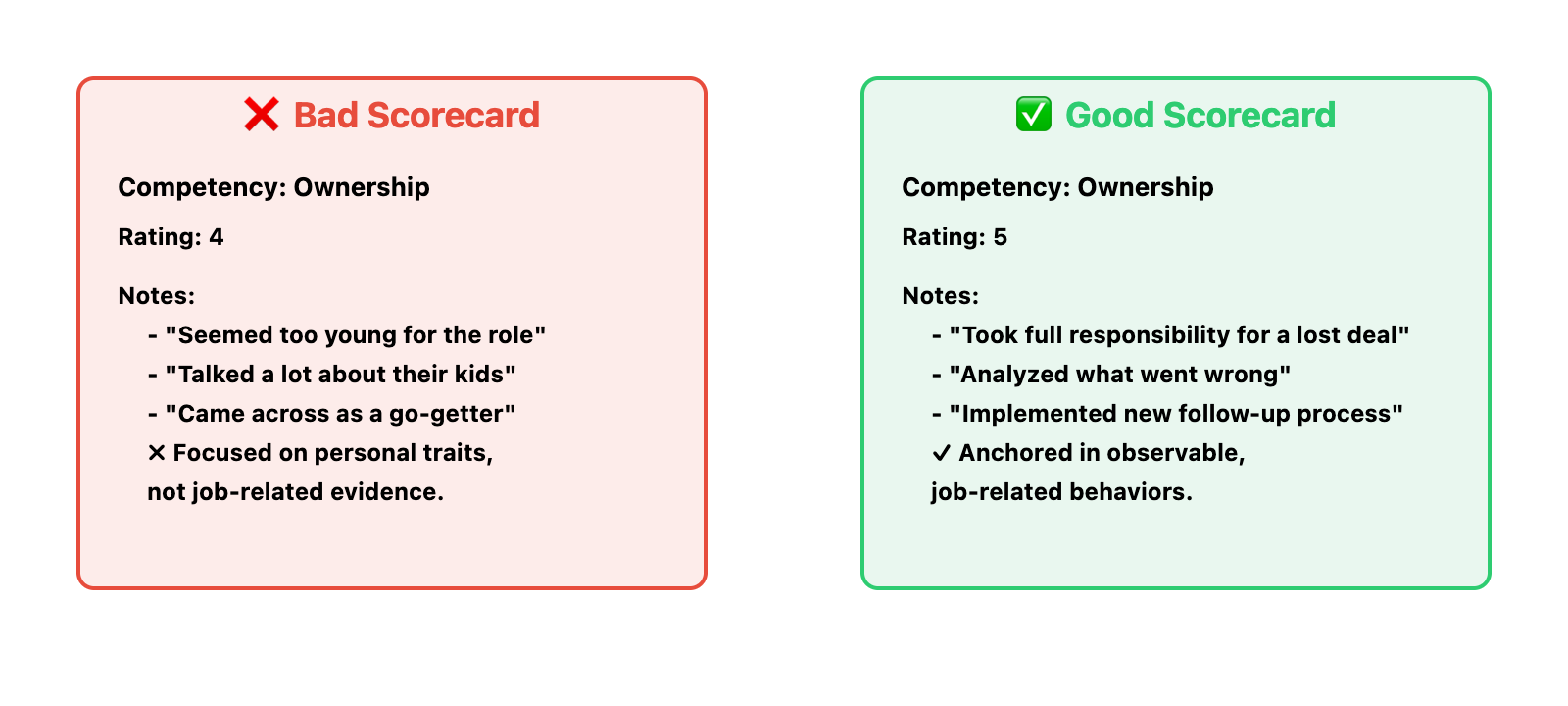Navigating the documentation process in sales interviews is about more than just taking notes. It's about ensuring fairness, compliance, and defensibility. Interview notes can become part of the official hiring record and may be reviewed in the event of a legal challenge or audit. That’s why it’s essential to document in a way that is both legally sound and genuinely useful for making hiring decisions. By focusing on objective, job-related observations, you’ll help your team avoid legal pitfalls, support a more equitable hiring process, and create a clear record of how decisions were made.
Effective interview documentation centers on observable behaviors and direct quotes, not personal impressions or assumptions. For example, rather than writing "Didn't like their energy", a fair note would be "Candidate spoke quietly and did not provide examples when asked about overcoming objections." This approach keeps your notes objective and clear, making it easy for others to understand exactly what happened in the interview.
Whenever you document, ask yourself: Would someone else reading this understand what the candidate actually did or said, without needing my interpretation? Stick to what you can see or hear, and use the candidate’s own words when possible. Remember, subjective impressions can introduce bias and may not stand up to scrutiny if your notes are ever reviewed by HR, legal, or external parties.
Here’s a sample dialogue that demonstrates this principle in action:
- Chris: I wrote down,
"Seemed unprepared and nervous."Do you think that's okay for my notes?- Victoria: I’d rephrase that to focus on what you actually observed. For example,
"Candidate paused for long periods before answering and didn’t provide specific examples when asked about closing deals."- Chris: That makes sense. So, I should avoid my impressions and just write what I saw or heard?
- Victoria: Exactly. That way, our notes are clear, factual, and defensible if anyone reviews them later.
In this exchange, notice how Victoria guides Chris to shift from subjective impressions to objective, behavior-based documentation.
Focus your documentation on information that is directly relevant to the sales role and its competencies. This includes specific examples of sales skills, communication abilities, problem-solving, and other job-related behaviors. Avoid recording personal details, protected characteristics (such as age, race, gender, marital status, disability, etc.), or vague personality judgments. For instance, instead of "Seemed too young for the role", use "Described managing a team of three, but did not provide examples of handling performance issues." Comments about family, appearance, or unrelated interests—such as "Talked a lot about their kids"—should be left out, as they are not job-related and could introduce bias or legal risk.
It’s also important to avoid making assumptions about a candidate’s abilities or fit based on anything other than their responses and behaviors during the interview. If you’re unsure whether something is appropriate to document, ask yourself: Is this directly related to the candidate’s ability to perform the sales role?
To help visualize the difference between effective and ineffective documentation, review the graphic below. The left side shows a "Bad Example" scorecard with vague, subjective notes like "Not a good fit" and "Seemed nervous." The right side shows a "Good Example" scorecard with specific, objective notes such as "Provided a detailed example of overcoming a sales objection" and "Answered all questions with relevant experience." This side-by-side comparison highlights how clear, factual documentation supports fair and defensible hiring decisions.

As the image demonstrates, using objective, job-related notes not only reduces legal risk but also ensures that hiring decisions are based on clear evidence rather than personal impressions. Consistently applying these documentation standards helps create a fairer and more defensible hiring process.
Your goal is to create records that are specific, job-related, and free from bias. For example, "Gave a detailed example of winning back a lost client by redesigning outreach strategy" is both clear and relevant. Avoid language that reflects personal preferences or stereotypes, and always tie your notes back to the competencies and requirements of the sales role.
Well-kept, factual records not only reduce legal risk—they also make it easier to justify and explain hiring decisions if they are ever questioned. Inconsistent or subjective notes can undermine your team’s credibility and expose your organization to legal challenges. By documenting carefully, you help protect both the company and the integrity of the hiring process.
As you move forward, you’ll have the chance to practice these skills in the upcoming role-play session, where you’ll refine your ability to document interviews in a way that is both fair and defensible.
